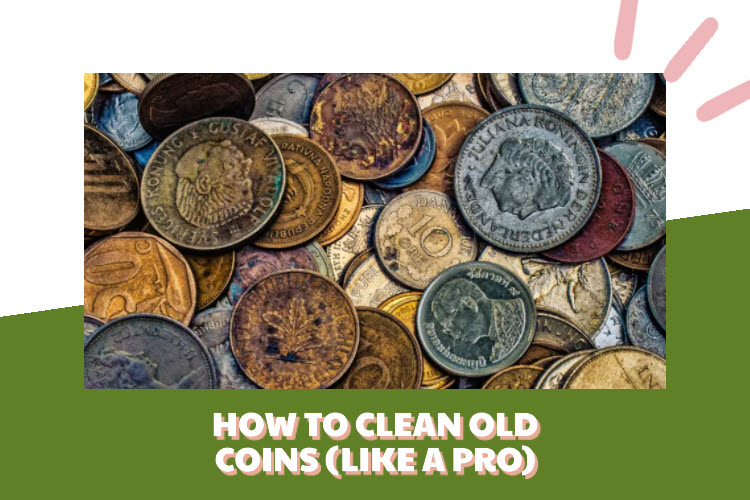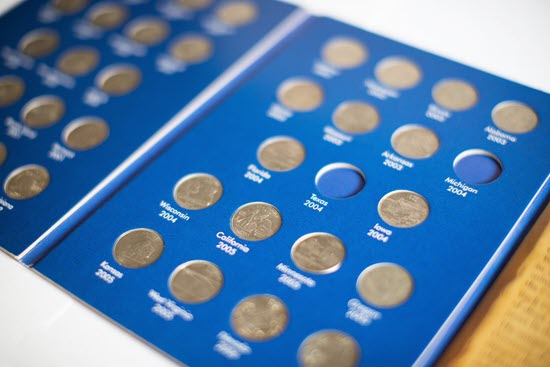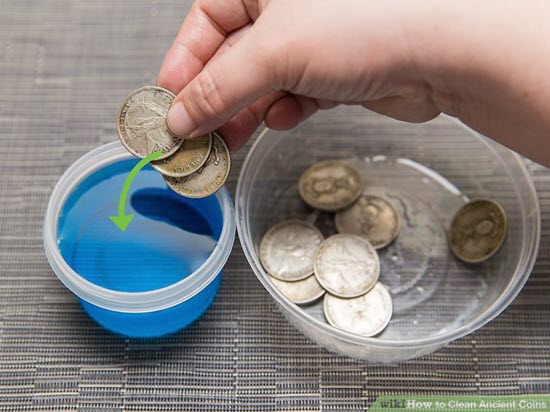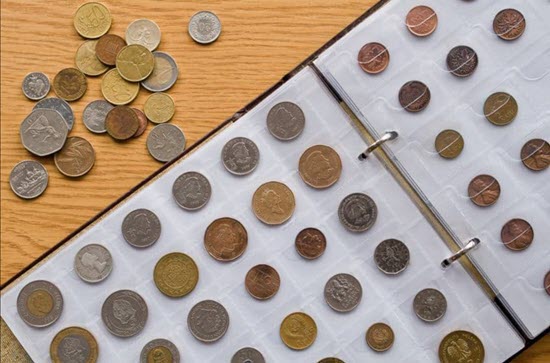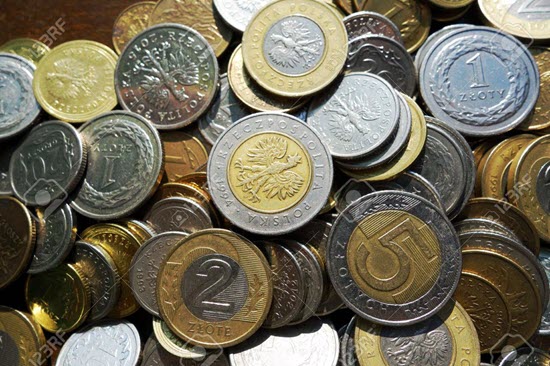Coin collecting is a popular hobby, but one challenge that collectors often face is figuring out how to clean old coins without damaging them. Whether you’ve inherited a collection of old coins or you’ve found one buried in your backyard, preserving their historical value and aesthetic appeal is important.
When it comes to cleaning old coins, you first need to understand the potential value and condition of the coins. Careless cleaning methods can significantly reduce a coin’s worth, so it’s crucial to select the best approach for their material and wear level.
There are a number of effective methods to clean old coins, which range from cleaning with soap and water, olive oil, distilled water, acetone, or even professional cleaning services, depending on your coins’ needs.
Key Takeaways Before You Start:
- Assess the value and condition of your coins before cleaning to avoid damaging them
- Choose the appropriate cleaning method and materials based on your coins’ specifics
- Consider professional cleaning services and proper storage to preserve your coins’ value and appearance
In This Article
The Value of Old Coins
Before diving into how to clean old coins (without causing damage), it is essential to appreciate the significance of these historical relics. The value of old coins goes beyond their monetary worth and lies in their historical context, artistic features, and rarity.
As you explore the world of coin collecting, you will come across coins with fascinating stories and cultural significance. Coins often reveal insights into the political, economic, and social developments of their time. By preserving these coins, you are helping to maintain a connection to our shared past.
So, when you decide to clean your old coins, remember that improper cleaning can diminish their value or even ruin them completely. By using the appropriate cleaning techniques, you will be able to maintain the integrity of your coins and showcase them in your collection with pride.
Keep in mind that some collectors and professionals advise against cleaning coins to avoid altering their original appearance or surface, as this could affect their value. For valuable and rare coins, it is always recommended to consult a professional before attempting any cleaning.
Determining the Condition of Your Old Coins
Before learning how to clean old coins without damaging them, it’s crucial to determine their current condition.
- Start by examining each coin closely, looking for signs of wear, corrosion, or dirt accumulation. Some coins may be covered with a layer of dirt, obscuring the details, while others may show areas where the metal has deteriorated due to environmental exposure.
- When examining your coins, take note of their overall appearance and any features that indicate their original minting process, such as sharpness of edges and depth of the relief. Coins in a higher state of preservation will have clear details and minimal signs of wear, while heavily worn coins may have entire designs worn away.
- Keep in mind that the value of a coin can be significantly impacted by its condition. Coins in poor condition may be less valuable than those in better condition, even if they are rarer or older. As such, avoid cleaning coins that are in excellent condition, as this may inadvertently decrease their value.
After assessing the coin’s current condition, you can now proceed with cleaning them.
Products to Clean Old Coins
When learning how to clean old coins, you need to gather the appropriate materials beforehand. This section will cover investing in coin-specific products and utilizing household items.
Coin-Specific Cleaning Products
To clean old coins without causing any harm, you may want to invest in products specifically designed for coin cleaning. These cleaning solutions and tools are formulated to safely remove dirt, tarnish, and debris from coins without damaging their surface or value. It’s essential to follow the product’s instructions carefully and test it on a less valuable coin if possible.
Household Cleaning Items
You don’t always have to rely on specialized products to clean old coins without damaging them. There are many safe and natural cleaning alternatives available, such as soapy water and a soft toothbrush, which can be gentle on coins and help remove dirt and grime.
Another option is to use a solution made of equal parts distilled water and white vinegar, which is well-suited to clean copper coins without causing harm. It’s crucial to remember not to apply too much pressure when cleaning with household items, as it may scratch or damage your coins.
Remember to assemble all the essential housekeeping materials before starting the cleaning process to avoid any inconvenience and ensure you have everything you need.
How to Clean Old Coins: 5 DIY Methods
Let’s look at the different methods for how to clean old coins in your coin collection.
1. Cleaning Old Coins with Soap and Water
One effective method on how to clean old coins without damaging them is by using soap and water. It’s a simple solution that can remove dirt, grime, and some tarnish from your coins.
- To start, prepare a gentle soapy solution by mixing a few drops of mild dish soap into a bowl of warm water. Do not use any harsh chemicals or abrasive cleaners, as these can damage the surface of your coins. Gently swish the water around to ensure the soap is well-distributed.
- Next, place your coins individually into the soapy solution. Using a soft cloth or a cotton swab, gently rub the surface of the coin to remove dirt and debris. Make sure to work on one coin at a time, to avoid unnecessary friction between the coins that might cause scratches or other damage.
- After cleaning each coin, rinse it thoroughly under running water to remove any remaining soap residue. You may use a fine-mesh strainer to prevent the coins from falling into the sink or slipping from your fingers.
- Once all the coins are rinsed, carefully place them onto a soft, clean cloth or paper towel. Gently pat each coin dry, avoiding any rubbing motions that can potentially scratch the surface. Allow the coins to air dry completely, moisture can cause corrosion over time.
By using this straightforward method, you can confidently and effectively clean your old coins without risking any damage to their surfaces. Just remember, practice patience and caution throughout the process to keep your coins in the best possible condition.
2. Using Olive Oil to Clean Old Coins
Cleaning old coins can be a delicate process, and one technique to do this without causing any harm is the Olive Oil Soak Method. This method is ideal for those who want to learn how to clean old coins without damaging them.
- To begin, you will need a shallow container, which you will fill with enough olive oil to cover the coins. Opt for a gentle, non-abrasive oil like extra virgin olive oil, minimizing the risk of damage to your coins.
- Next, place your old coins carefully in the container, making sure they are fully submerged in the oil. It is important that you don’t overcrowd the container, as coins rubbing against each other might cause scratches or other damage.
- Allow the coins to soak for a few days or even a week, depending on the level of dirt and grime. During this time, the olive oil will work to loosen dirt, tarnish, and other surface residues, making it easier to remove them without damaging the coin’s surface.
- After the soaking period, gently remove the coins from the oil, and use a soft cloth or cotton swab to wipe away any loosened debris. Be cautious not to rub too hard or use abrasive materials, as this could scratch or damage your coins. If you notice stubborn grime remaining on the coins, you can let them soak for another few days and repeat the cleaning process until satisfied.
- Once you have cleaned the coins to the best of your ability, carefully pat them dry using a soft, non-abrasive cloth. Remember to store your cleaned coins in a proper coin album or container to prevent future damage, and avoid touching them with your bare hands, as the oils in your skin can cause tarnish.
By following these steps, you can effectively use the Olive Oil Soak Method to clean your old coins without causing any damage to their valuable surfaces.
3. Cleaning Old Coins with a Distilled Water Soak
When learning how to clean old coins without damaging them, a simple and effective method is using a distilled water soak. Distilled water, due to its purity, will not harm the coin’s surface, making it an excellent option for cleaning delicate items.
- Start by selecting a clean, non-abrasive container. Fill the container with enough distilled water to completely submerge your coins. It’s essential to use distilled water rather than tap or bottled water, as they may contain minerals and impurities that can damage the coins.
- Gently place your coins in the water and let them soak for 24 hours. This soaking process will help loosen any dirt, grime, and debris that may have accumulated on their surfaces. Avoid the temptation to rub or scrub the coins, as it can scratch their delicate surfaces.
- After 24 hours, carefully remove your coins from the water using plastic or silicone tongs. Do not use metal utensils, as they may cause unintended scratches or damage.
- Now, prepare a second container with fresh distilled water. Rinse each coin gently in this new container, taking care not to rub the surface. This step will help remove any remaining debris that may still be adhering to the coins after the initial soak.
- Place the rinsed coins on a clean, soft towel or microfiber cloth to dry. Spread them out, ensuring they do not touch each other, and allow ample air circulation around them. Be patient and let the coins air-dry naturally, resisting the urge to pat or rub them, as even a soft cloth can cause unwanted scratches.
By following these steps and using a delicate approach, you can clean your old coins effectively without causing any damage to their surfaces. Remember, the key is patience and gentle handling throughout the process.
4. Acetone Treatment for Old Coins
When learning how to clean old coins, acetone, which is a common organic solvent, has been successfully used in various coin cleaning processes to remove surface dirt and grime without causing harm to the coin’s metal or patina.
To begin the acetone treatment, you’ll need the following items:
- 100% pure acetone (do not use nail polish remover)
- A shallow glass or ceramic container
- Soft cotton swabs or lint-free cloth
- Tweezers or tongs
- Latex or nitrile gloves
- A well-ventilated area to work in
First, pour a sufficient amount of pure acetone into the container so that you can fully submerge the coin. Gently place your old coin into the acetone using tweezers or tongs and allow it to soak for a few minutes. Remember that acetone is highly volatile and evaporates quickly, so work in a well-ventilated area while wearing gloves to minimize exposure.
After soaking the coin in acetone, carefully remove it using tweezers or tongs and gently wipe any remaining dirt away using the soft cotton swabs or lint-free cloth. Refrain from scrubbing or applying too much pressure, as this can damage the delicate surface of the coin.
Once the cleaning process is complete, it’s essential to let the coin air-dry on a non-abrasive surface, ensuring that any remaining acetone evaporates completely. Avoid using heat or applying force to expedite the drying process, as this can potentially cause damage to the coin.
It’s worth mentioning that acetone treatment might not be suitable for every type of old coin, especially those with extremely delicate surfaces or valuable patinas. Always research the specifics of the coins you plan to clean before attempting any treatment, and consider consulting a professional if you’re uncertain about the process.
In conclusion, applying acetone treatment can be an effective method for cleaning old coins without damaging them. By following these guidelines and working carefully, you can safely restore the appearance of tarnished coins and appreciate their historical value.
5. Electrolysis Cleaning for Old Coins
When considering how to clean old coins without damaging them, one effective method is the electrolysis cleaning technique. This process involves using electrical current to dissolve corrosion and other unwanted deposits on the surface of the coin, without causing any harm to the underlying metal.
To begin, you’ll need a few supplies:
- A non-conductive container (such as a plastic or glass container)
- A low-voltage power source (such as a 6 to 12-volt battery charger)
- A stainless steel cathode
- A non-metallic holder for the coin
You’ll also need a solution that can conduct electricity, often comprised of water mixed with a small amount of salt or baking soda.
- First, fill your container with the electrolyte solution, ensuring that there’s enough liquid to fully submerge the coin. Attach the positive terminal of the power source to the stainless steel cathode, and then submerge the cathode into the solution. Next, securely affix the coin to the non-metallic holder, ensuring that nothing but the coin will make contact with the electrolyte. Connect the negative terminal of the power source to the coin holder.
- Slowly lower the coin into the solution, making sure that it’s not in direct contact with the cathode. Turn on the power source, and the electrolysis process will begin. You should see small bubbles forming around the coin, as the electrical current works to dissolve corrosion and other deposits. The duration of this process will depend on the coin’s condition and the voltage of the power source, but it generally takes between 30 minutes to a few hours.
- Keep an eye on the coin during the process, and periodically turn off the power source to inspect its condition. You might need to gently brush the coin’s surface with a soft toothbrush to remove loosened debris. Once the coin is clean, remove it from the holder and rinse it thoroughly with clean water to remove any remaining electrolyte solution.
- Keep in mind that while the electrolysis cleaning technique is effective for many ancient coins, it may not be suitable for every coin type. Certain delicate coins or coins made of debased silver might require alternative cleaning methods, such as galvanic or electrolytic cleaning to avoid damaging the surface.
By following these steps and using the electrolysis cleaning technique, you can confidently and effectively clean old coins without causing damage to their valuable surfaces.
Professional Coin Cleaning Services
When to Consider Professional Cleaning for Your Dirty Coins
When it comes to knowing how to clean old coins without damaging them, sometimes the best option is to consult a professional cleaning service. If your coins are rare, valuable, or have historical significance, it is crucial to avoid using DIY methods that may cause irreversible damage.
In these cases, a professional coin cleaning service is the preferred choice. They have the tools, techniques, and expertise to preserve your precious investment.
How to Choose a Reliable Coin Restoration Service
When selecting a professional service to clean your old coins, consider the following factors:
- Experience: Look for a company with a solid background in numismatics and proven expertise in handling old coins. A reputable service should have years of experience in the field and positive customer reviews.
- Certifications: Ensure the service is certified by a recognized authority or professional organization in numismatics. This accreditation guarantees quality work and adherence to industry standards.
- Handling Process: Inquire about the methods and equipment used for cleaning your coins. A competent service will have a range of non-destructive techniques that cater to the specific needs of each coin, ensuring that their original condition is preserved.
- Communication: A transparent service will keep you informed throughout the cleaning process, providing progress updates and answering any questions you may have. This helps ensure that you feel secure in entrusting your valuable coins to their care.
Remember, when it comes to cleaning old coins, your primary concern should be preserving their value and authenticity. By entrusting your prized possessions to a professional cleaning service, you can guarantee that they will receive the care and attention they deserve, without causing any damage.
Storing Valuable Coins after Cleaning
After successfully cleaning your old coins with the techniques mentioned in our guide on how to clean old coins without damaging them, it’s crucial to store them correctly to maintain their condition.
- First, always handle your cleaned coins with clean hands or wear cotton gloves to avoid transferring oils, dirt, or fingerprints onto the coins’ surfaces. Also, hold the coins by their edges to minimize contact with the face of the coin.
- To store your coins, opt for acid-free materials like cardboard or plastic coin holders. Avoid using PVC-based materials, as they may release chemicals over time that cause damage to the coin. For longer-term storage, consider purchasing coin capsules made of inert materials like acrylic. These provide airtight protection and can prevent damage from external sources such as moisture and dust.
- For added protection, invest in a coin storage box, album, or binder that’s designed specifically for coin collectors. These will provide a stable and organized environment for your coins. Keep in mind that you should store your coin collection in a cool, dry, and dark place, away from direct sunlight, temperature fluctuations, and humidity.
- Properly labeling your coins with relevant information like dates, mintmarks, and grades can help future identification and organization. However, avoid using adhesive labels directly on the coin or its holder, as these can harm the coin’s surface in the long run. Instead, use non-adhesive labels or write directly on the storage container.
By correctly storing your cleaned coin collection, you can ensure that your treasured items remain in excellent condition for years to come. Remember that following the steps mentioned above will not only help to preserve the coins’ appearance but also protect their value for future appreciation.
How to Keep Old Coins in Mint Condition
Regular Maintenance
In your quest to learn how to clean old coins without damaging them, it’s essential to take preventive measures to keep them in good condition. Regular maintenance can help prevent the buildup of dirt, grime, and tarnish on your coins.
Here are three steps to follow when maintaining your coin collection:
- Clean your coins periodically to remove surface dust or debris. Remember to use non-abrasive materials and gentle cleaning solutions to avoid damaging the coins.
- Store your coins in a dry, cool, and dark place to minimize exposure to environmental factors, which can accelerate the tarnishing process.
- Use coin storage supplies, such as acid-free holders and trays, to provide a safe and protective environment for your coins.
Handling Coins Properly
Handling your old coins properly is another crucial aspect of preserving their condition and value. Here are some tips on how to handle your coins without causing unnecessary damage:
- Wash your hands: Before touching your coins, always wash your hands and dry them thoroughly. This will help to minimize the transfer of oils, dirt, and other contaminants from your skin to the coin’s surface.
- Hold by the edges: When holding a coin, grip it by the edges with your thumb and forefinger. This way, you avoid touching the coin’s face, which can lead to smudges, fingerprints, and scratches.
- Use gloves if necessary: If you’re handling particularly valuable or delicate coins, consider wearing soft cotton or nitrile gloves for added protection.
By adopting these preventive measures, you can effectively maintain your old coin collection and learn how to clean old coins without damaging them, ensuring their value and appearance are preserved for years to come.
Frequently Asked Questions
In some cases, leaving the dirt and patina intact is better for preserving the value of your coins. If you’re unsure, consult a professional numismatist.
However, always carefully inspect the coins after cleaning and, if you have concerns, consult a professional before proceeding.
Final Thoughts on How to Clean Old Coins
In summary, learning how to clean old coins without harming them is a valuable skill for collectors and enthusiasts. It’s essential to choose the right cleaning method, keeping in mind the type of coin and its age. Remember, always test your chosen cleaning method on a less valuable coin before applying it to your prized collectibles.
When cleaning old coins, avoid using harsh chemicals or abrasive materials. Instead, opt for gentle methods like soaking in distilled water or using a soft toothbrush. For silver coins, a baking soda and aluminum foil solution can be effective, while bronze coins may benefit from treatment with distilled water combined with lemon juice or olive oil.
Keep in mind that some coins may have a unique patina that adds value, and cleaning them might harm their worth. In such cases, it’s best to consult an expert before attempting any cleaning.
By following these guidelines, you can ensure your coin collection retains its beauty and value for years to come. Happy coin cleaning!
